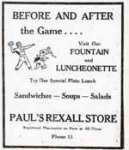Draft takes a backseat to football

A patriotic program was presented to junior high, senior high and junior college students at the Fox Theatre at 11 in morning on Friday, Sept. 11, 1942.
A salute to the flag and the singing of "The Star Spangled Banner" led off the program. "Mr. Blabbermouth," a movie pointing out the importance of stifling rumors during the war was shown to the students along with a movie showing the manufacture of aluminum. The previous evening 55 war mothers of the community were guests of the theatre management for the regular Fox feature.
Also in the Sept. 11, 1942, Gazette was an article concerning Ensign Robert Gordon, 22, son of Mr. and Mrs. Ira Gordon, who was credited with dropping a direct hit bomb on a Japanese liner during a battle he was involved in. His mother heard the announcement of her son's achievement on the radio over KFAB and called the Gazette. Mrs. Gordon said that she had just received a letter from her son dated the day after the Aug. 24 battle and he didn't say a word about it. He did sound anxious to come home though she said and Robert added that, "War isn't any fun."
"The Bystander" column had some war-related comments on September 11th worthy of note. "The fever which has resulted locally for the past two weeks over assignment of an air base has almost overshadowed worries about the draft."
It was September 1942 -- football time ... "With a junior high squad, a senior high squad, a junior college squad and a squad on every vacant lot all working diligently to gain gridiron perfection, passing pedestrians are forced to put up a strong defense or be thrown for a loss ... It's a good idea. Let all of American youngsters play hard with footballs now, so they'll be in condition for the day when they'll be sent into the BIG game-the game in which the footballs are taken away and the "team" is told to "get in there and fight."
There was an accompanying two pages of ads, all wishing the local football teams luck.
There was no official announcement but all of the contracts for the building of the McCook Army Air Base were let over the weekend of Sept/ 12-13, 1942. More facts to come out about the base ... the McCook base would be used as a bomber training base, probably as a satellite to some other large air base. Those runways which were being "rushed" would accommodate the largest of the Army's big planes.
The Petti-McDonald Construction Co. of Kansas City got the contract for the erection of 85 frame buildings in all. These will include barracks, one large hanger, offices, officers' housing quarters and other buildings essential in the operation of the base. Mr. McDonald set up his temporary headquarters in the Keystone Hotel and expected to be in full swing in a week to 10 days from Sept. 15, and expected to be done with their part by Nov. 15, 1942.
Truckers started hauling lumber on the 15th to the grounds on which the buildings were to be erected, at the southwest corner of the field. On Sept. 16, a large capacity water well was sunk, and actual construction was begun on the runways and buildings. Harry Strunk had an editorial in the Gazette of Sept. 16 dealing with local men quitting their regular job in order to get a higher paying job building the McCook Army Air Base. He advised against it and was backed up by a conversation he heard one of the contractors having with a man looking for work. "The first thing the contractor asked was whether or not he was employed at present and why he was seeking another job ... When told that the only reason he was seeking a change was for higher pay, the contractor said, "I would advise you to stay where you are ... We need men, but not that bad ... You must realize that this job is short, less than 90 days, and we don't intend to disrupt business generally any more than is absolutely necessary." Clapp's Store for Women was meeting a need ... they advertised a smart jumper maternity dress for $8.95 ... war babies were being produced! Safeway was urging women to do their "big order" grocery shopping on the weekdays instead of weekends with their blue food-order stamps.
Rattlesnakes were a problem and an average of five a day were being killed by engineers and workmen on the new air field. Farmers had reported a rapid increase in the number of rattlesnakes in this area during the past few years but before 1938 they were seldom seen in the area.
Main Street has the Farmer's Market going again this year on West B between Peterson Jewelry and Farrell Hallmark store. There's sweet corn, potatoes, tomatoes, zucchini, squash, turnips, onions, cabbage and cauliflower ... and a lot of other produce plus sometime jams and jellies too.
